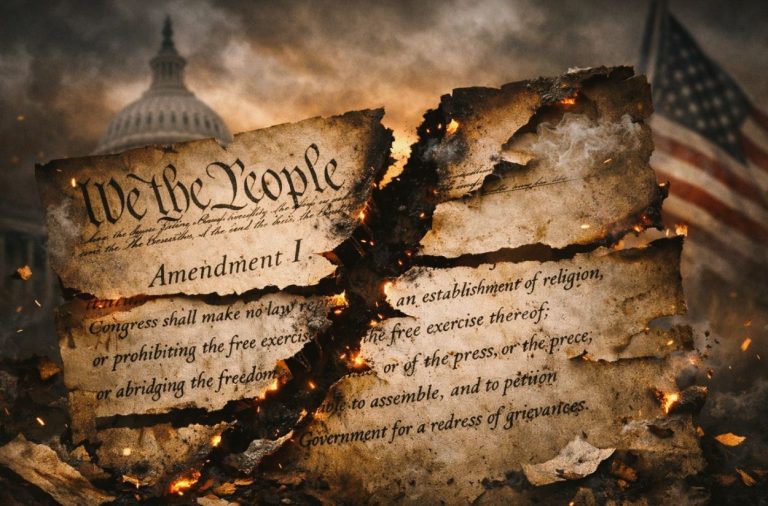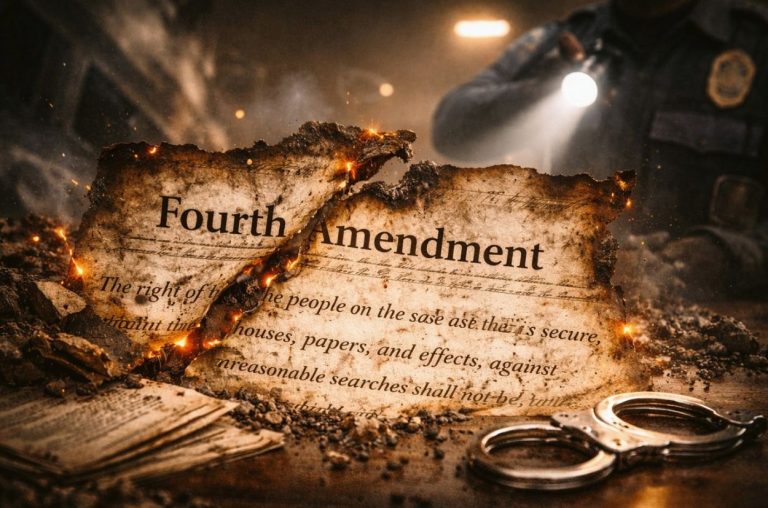

There is no evidence to conclude that the post constitutes incitement or a true threat.

By Matthew A. McIntosh
Public Historian
Brewminate
Introduction
In the realm of political discourse and public commentary, few legal protections are as fundamental as those enshrined in the First Amendment of the United States Constitution. This amendment guarantees freedom of speech, ensuring individuals can express opinions without fear of government censorship or retaliation. Former FBI Director James Comey’s controversial “86 47” post has sparked widespread debate about its meaning, intent, and legal safeguards. That discussion is healthy. We should know our Constitution and the rights it protects. Comey’s post is one example of an absolutely protected right.
What is the “86 47” Post?
Comey posted the cryptic message “86 47” on his social media accounts. The phrase “86” is American slang that generally means to “get rid of” or “throw out,” often used in hospitality or retail to indicate an item is no longer available. The “47” is widely understood as a reference to the 47th president of the United States, suggesting a call to remove that individual from office.
However, many Trump’s supporters have interpreted “86” in a far more extreme way—arguing it implies a call to “assassinate” the president. This interpretation, while circulating widely in certain political circles, lacks any clear evidence or proof of Comey’s actual intent behind the phrase. The ambiguity of “86” as slang makes would be impossible to definitively assign such a violent meaning to Comey’s post without further context or clarification from him. Comey, however, provided that clarification by removing the post and stating he absolutely did not intend the post to suggest or promote any violent acts, including assassination.
The First Amendment Framework
Overview
The First Amendment states: “Congress shall make no law… abridging the freedom of speech.” This protection is broadly interpreted to include speech by private citizens, public officials, and even controversial or unpopular opinions, particularly in the political arena.
The Supreme Court has long held that political speech enjoys the highest level of constitutional protection. In landmark cases such as New York Times Co. v. Sullivan (1964) and Brandenburg v. Ohio (1969), the Court emphasized that speech cannot be punished unless it incites imminent lawless action or constitutes a true threat.
Applying the First Amendment to Comey’s Post
Political Speech at Its Core: Comey’s “86 47” post is a form of political expression. It comments indirectly on the presidency and political process, a topic that is central to public interest and robust debate. Under First Amendment principles, political commentary is among the most protected types of speech, even if it is blunt, sarcastic, or offensive to some.
No Incitement of Imminent Lawless Action: The Brandenburg standard requires that speech be intended to incite or produce imminent lawless action and be likely to do so in order to lose First Amendment protection. Comey’s cryptic phrase, while suggestive, does not explicitly call for immediate illegal acts. It lacks a clear directive that would meet the threshold of incitement.
No True Threat: True threats—statements meant to intimidate or incite fear of violence—are not protected. However, Comey’s post, cryptic as it is, does not meet the legal definition of a true threat against a person or group. The post’s ambiguity prevents a definitive reading as a direct threat.
Context of Public Discourse: As a public figure and former federal official, Comey operates in the sphere of public discourse where speech is scrutinized and debated. The First Amendment especially protects the right of individuals, regardless of office or status, to comment on government and political affairs.
The Ambiguity of “86” and Interpretations
It is important to note the ambiguity surrounding the phrase “86.” While widely understood in common usage as meaning “to get rid of” or “remove,” some have pushed a more sinister reading—particularly Trump supporters who claim it signals “assassinate.” Without direct evidence of Comey’s intent or explicit statements from him confirming this violent interpretation, the assumption remains speculative.
Legal protections hinge on intent and context. Absent proof beyond a reasonable doubt in a court of law that Comey meant “assassinate” or intended to incite violence, the post remains protected political speech. The First Amendment protects controversial, even offensive expressions, so long as they do not cross into direct threats or incitement.
The Investigation into Comey: Politically Motivated and Doomed to Fail
Following the uproar over the “86 47” post, an investigation was launched into Comey’s conduct. However, this probe is clearly politically motivated, aimed more at scoring points with the MAGA base than uncovering any genuine legal wrongdoing. The investigation targets Comey precisely because of his past antagonism toward Trump and his prominent role in politically charged events.
Given the strong constitutional protections around political speech, as well as the lack of any credible evidence that Comey intended to incite violence or threats, this investigation will not lead to any legal consequences because the evidence necessary to establish intent does not exist. Instead, it serves primarily as a political weapon, designed to intimidate critics rather than uphold the rule of law.
Conclusion
While Comey’s “86 47” post is protected speech, this does not mean it is free from criticism or consequences in the court of public opinion. The First Amendment does not shield speech from social or professional fallout, but it does protect the speaker from government punishment such as censorship, legal prosecution, or retaliation based on the content of the expression.
James Comey’s “86 47” post exemplifies the robust protections granted to political speech under the First Amendment. Despite the controversy and extreme interpretations of the phrase “86” by some, there is no legally sufficient evidence to conclude that the post constitutes incitement or a true threat. The investigation launched against Comey is a politically motivated effort with no real chance of success, underscoring how constitutional safeguards protect speech even amid intense political battles. This case highlights the vital role free speech plays in preserving democratic dialogue, allowing individuals—even those with complex political views—to express themselves openly without fear of government reprisal.
Originally published by Brewminate, 05.27.2025, under the terms of a Creative Commons Attribution-NonCommercial-NoDerivatives 4.0 International license.


